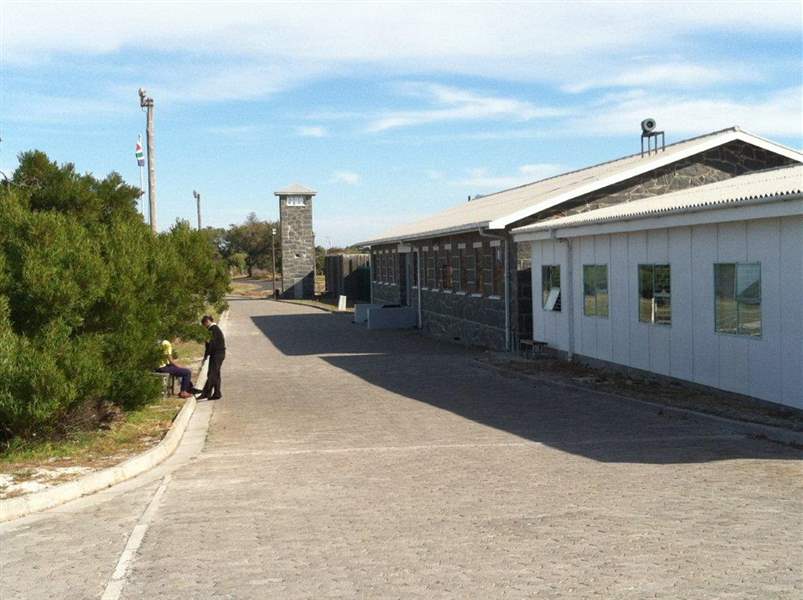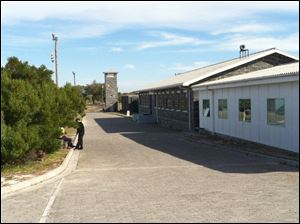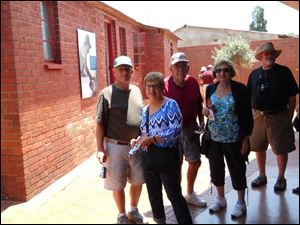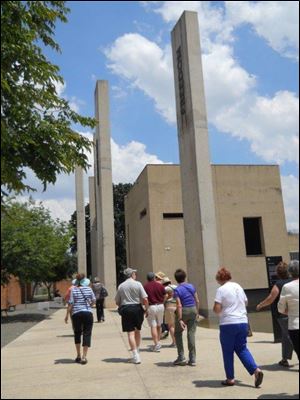
A mission to South Africa
Members of Congregation B’nai Israel in Sylvania reach out to nation’s Jews
12/14/2013
The penitentiary where Nelson Mandela was imprisoned.
NOT BLADE PHOTO

The penitentiary where Nelson Mandela was imprisoned.
Members of Congregation B'nai Israel in Sylvania had close thoughts of South Africa and Nelson Mandela on learning of the former South African president's death on Dec. 5. Twenty-two people from B'nai Israel, along with their cantor, had returned from South Africa about two weeks before, where they had spent two weeks on a mission trip.
“A mission means there was a specific, official function, a Jewish function, and that was to explore and reach out to the Jewish community in South Africa,” said Ivor Lichterman, hazzan, or cantor, of the Conservative synagogue. The South African Jewish community is very small. The cantor said, “It's probably about 65, 70,000 Jews in a population of 50 million.”
Cantor Lichterman was born and raised in South Africa; his parents moved there as survivors of the Warsaw, Poland, ghetto uprising and concentration camps.
When he started at B'nai Israel about two years ago, Cantor Lichterman said to Lee Kwait, a congregant who operates Let's Cruise, Inc., that he wanted to take a group to South Africa, and Mr. Kwait organized the travel. The trip, “a solidarity mission with the Jewish community of South Africa,” the cantor said, filled up quickly.
“Off we went,” Cantor Lichterman said, to “study my family's roots and the connecting history of race relations. So we actually traveled in Mandela's footsteps, and my mother still lives there and has a lot of contact with that whole history because my mother was one of the founders of the Cape Town Holocaust Centre.”

Members of Congregation B’nai Israel (left to right): Dave Treuhaft, Diane Treuhaft, Lennie Thal, Selma Master, Jeff Lublin.
On learning of Mandela's death, the cantor said, “I called my mother, who still lives in Cape Town; my mother is 91. We [had] all visited with her [on the trip], and I asked her how she felt. She was very distraught. She said he was a great man; she met him, she had dealings with him through their work at the Cape Town Holocaust Centre, which was actually opened by Mandela.”
The group had gone to Robben Island, the prison from which Mr. Mandela was freed. Cantor Lichterman said, “As soon as you go there it has the appearance of a concentration camp,” but it is not like one, he added.
The Robben Island stop was Mr. Kwait's trip highlight. “Reading ]Mandela's] story, I would try and picture how a man who could have such convictions would forgo his family, his friends, comfort,” Mr. Kwait said.
“Twenty-seven years,” Cantor Lichterman said. “A man gave up the prime of his life and he came out and he averted civil war; he averted war and bloodshed to the extent possible.
The Mandela experience was not the centerpiece of the trip, however. That was Jewish South Africa, and especially Cape Town, where the cantor was brought up.
“Our main purpose of going was because Ivor was from South Africa,” Leah Connor of Toledo said.
“Of course, he constantly told us how beautiful, how scenic South Africa was, and that piqued our curiosity,” said Luann Garber of Ottawa Hills.
“Our angle was the whole South African history,” Cantor Lichterman said, “like why did my family go there? What was it like being born there, raised there? We went to the school that I went to for 12 years, we went to my father's synagogue [his father was a prominent cantor] which now is a store.” Cantor Lichterman's year of required military duty even got attention. “I gave … a year of my life for the South African apartheid government which I knew was going to come to an end within a decade or two. It changed 18 years later,” the cantor said.
Cantor Lichterman left South Africa when he graduated college. “I bought a one-way ticket, although I really thought I was going to go back. I came to New York to study at Yeshiva University, to do a master's in Judaic studies. The Soweto riots broke out in July 1976; there were riots in the black part of Johannesberg; and I had left two months before those riots. So I'm thinking, Am I going to go back? I met my wife, who is an American, and that was the end of the story.”

B’nai Israel group arriving at the Apartheid Museum in Johannesburg.
Another stop on the congregational trip was the Origins Centre in Johannesberg, which displays copies of “the oldest humanoid fossils found,” at 3 ½ million years old, Mr. Kwait said. “The purpose of the museum is to tell the story of the sand people, which are the Bushmen, the original occupants of South Africa.”
“To be able to take my congregation on a voyage of discovery—of my personal roots, which is part of world Jewish history, interwoven with the history of race relations and the development of human civilization in Africa, I mean, to go stomping around Africa like that was just amazing,” Cantor Lichterman said.
Contact TK Barger @ tkbarger@theblade.com, 419-724-6278 or on Twitter @TK_Barger.